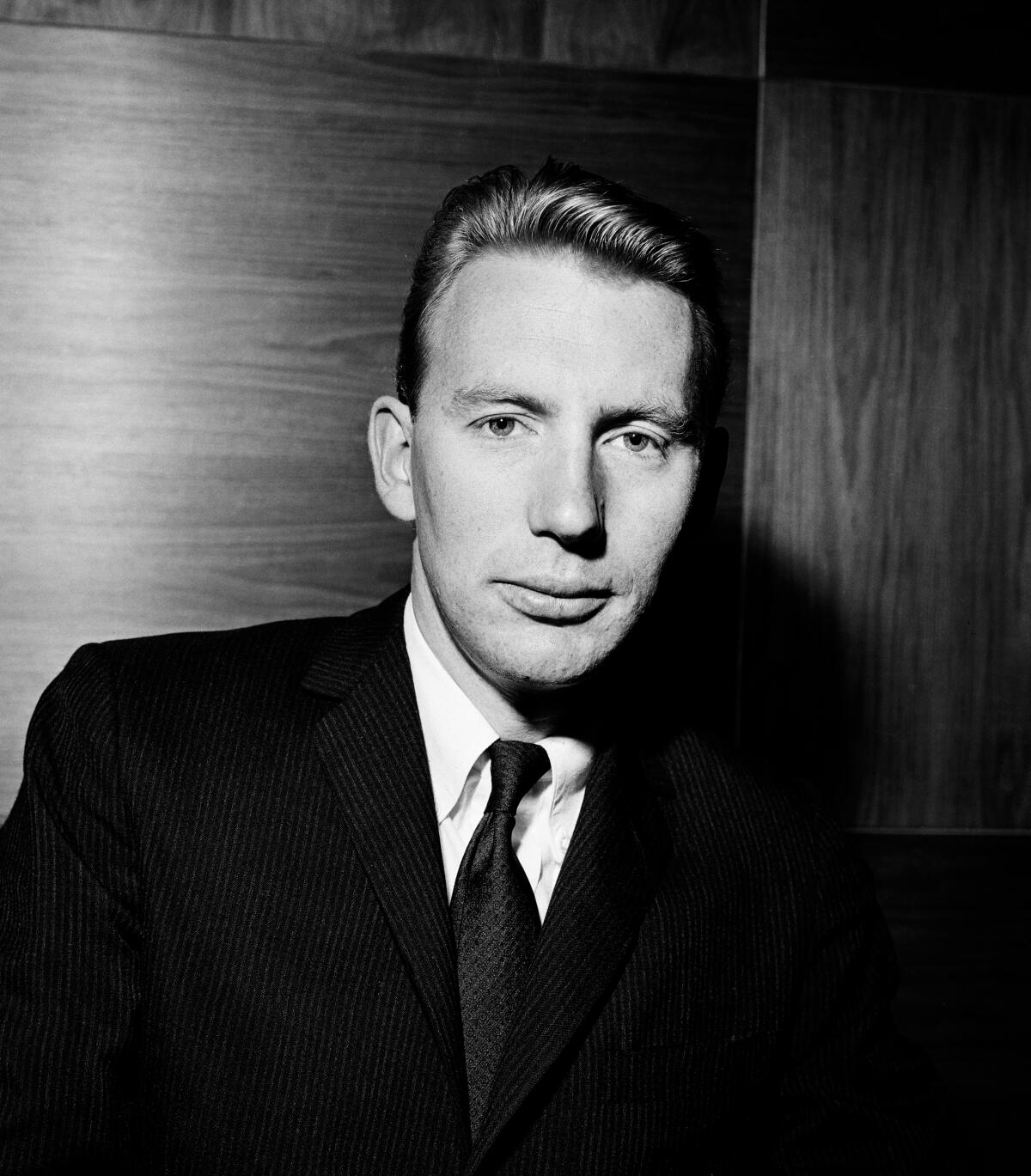Robert MacNeil, the stately journalist who brought news to PBS, dies at 93

Robert MacNeil, whose coverage of the Watergate scandal led to the first nightly newscast for PBS, died Friday in Manhattan after a long illness. He was 93.
A PBS representative confirmed MacNeil’s death.
MacNeil was the founding anchor of “PBS NewsHour,” which was first launched in 1975 as “The Robert MacNeil Report” and later renamed “The MacNeil/Lehrer NewsHour.” In the years before cable news and the internet, the program was the lone national TV alternative to the newscasts on ABC, CBS and NBC.
MacNeil was born in Halifax, Nova Scotia, on Jan. 19, 1931, the son of a member of the Royal Canadian Mounted Police. He dropped out of Dalhousie University in Halifax to pursue an acting career and became an announcer for CBC.
After moving to England in 1955, he turned to journalism, joining the news service Reuters. Five years later he became a London correspondent for NBC News.
MacNeil was transferred to NBC’s Washington bureau in 1963 during the Kennedy administration and reported extensively from Dallas when President John F. Kennedy was killed by an assassin. Viewers who watched NBC News on Nov. 22, 1963, heard MacNeil call in from a phone booth to confirm the president’s death.
MacNeil became an anchor at NBC News and on the network’s local New York station, WNBC.

MacNeil was hired by PBS in 1971 to be the host its first public affairs program, “Washington Week in Review.” The service planned to team him with another former NBC News journalist, Sander Vanocur, to cover the 1972 presidential campaign.
But PBS plans to get into the news business met resistance from President Nixon’s administration. Nixon objected to the hiring of Vanocur, who was known to be close to Kennedy, who defeated him in the 1960 presidential race.
MacNeil believed the opposition was driven by Nixon’s general disdain for the media.
Continuous coverage of the Watergate hearings in 1973 drew big audiences and viewer contributions. It also led to the creation of the “PBS NewsHour.”
“I think it was primarily the fear of a fourth, as he saw it, ‘liberal’ network,” MacNeil said in a 2020 interview with The Times.
Vanocur didn’t take the job, and MacNeil was eventually teamed with Jim Lehrer, a former Dallas newspaper reporter who worked behind the scenes at PBS. They ended up providing coverage of the Senate hearings on Watergate.
The coverage made the pair TV news stars.
The commercial networks were hesitant to preempt their game shows and soap operas to present the hearings. They rotated in providing gavel-to-gavel coverage.
But for noncommercial PBS, the hearings were a major opportunity. For 47 days and nights in 1973, the service covered every minute of the proceedings. They were repeated in prime time for viewers who missed the ongoing daytime saga in the era before DVRs and streaming.
Viewers enjoyed the dignified combination of MacNeil, who spoke in a clipped, erudite manner; and Lehrer, a Kansas native with a soft heartland drawl. Off-camera they became close friends and business partners. (Lehrer died in 2020).
Their Watergate coverage brought PBS big ratings. Financial contributions from viewers poured in.
A year after the hearings, MacNeil was given his own nightly half-hour program, produced out of the studios of PBS New York flagship WNET. Lehrer reported from Washington, D.C., and his name was added to the program title in 1976 when it was offered to stations nationally.
In 1983, the program was renamed “The MacNeil/Lehrer NewsHour” and became a signature series for PBS that still airs today as “PBS NewsHour.”
The anchor duo entered a unique arrangement when they formed a production company and became owners of the program in the mid-1980s. They produced the “PBS NewsHour” until 2014, when it was taken over by the service’s Washington station WETA.
“The MacNeil/Lehrer NewsHour” never deviated from its mandate to provide a more subdued and serious approach to covering the news of the day. When the trial of O.J. Simpson became a dominant TV news story in the mid-1990s, the “NewsHour” devoted scant attention to it outside the verdict.
After leaving the program, MacNeil continued to produce and host documentaries for PBS. He also wrote several books.
“He was brilliant and urbane, but always with a delightful sense of irony,” said Judy Woodruff, who later served as a “PBS NewsHour” anchor. “I’m so grateful to have spoken with him in January on his birthday, when that iconic, deep Canadian baritone voice sounded exactly as it had when he last anchored the ‘NewsHour’ almost 30 years ago.”
MacNeil is survived by two children from his first marriage, Ian and Cathy MacNeil; two children from his second marriage, Alison and Will MacNeil; and five grandchildren.
More to Read
Inside the business of entertainment
The Wide Shot brings you news, analysis and insights on everything from streaming wars to production — and what it all means for the future.
You may occasionally receive promotional content from the Los Angeles Times.











